- Home
- John le Carré
Tinker, Tailor, Soldier, Spy Page 12
Tinker, Tailor, Soldier, Spy Read online
Page 12
He was still there, Smiley assured her. The same cover, the same rank.
“And still occupying that dreadful little suburban house in Highgate that Toby’s watchers hated so? Forty Meadow Close, top floor. Oh, it was a pest of a place. I love a man who really lives his cover, and Aleks did. He was the busiest culture vulture that Embassy ever had. If you wanted something done fast—lecturer, musician, you name it—Aleks cut through the red tape faster than any man.”
“How did he manage that, Connie?”
“Not how you think, George Smiley,” she sang as the blood shot to her face. “Oh, no. Aleksey Aleksandrovich was nothing but what he said he was—so there; you ask Toby Esterhase or Percy Alleline. Pure as the driven snow, he was. Unbesmirched in any shape or form—Toby will put you right on that!”
“Hey,” Smiley murmured, filling her glass. “Hey, steady, Connie. Come down.”
“Fooey,” she shouted, quite unmollified. “Sheer unadulterated fooey. Aleksey Aleksandrovich Polyakov was a six-cylinder Karla-trained hood if ever I saw one, and they wouldn’t even listen to me! ‘You’re seeing spies under the bed,’ says Toby. ‘Lamplighters are fully extended,’ says Percy”—her Scottish brogue—“‘We’ve no place for luxuries here.’ Luxuries my foot!” She was crying again. “Poor George,” she kept saying. “Poor George. You tried to help but what could you do? You were on the down staircase yourself. Oh, George, don’t go hunting with the Lacons. Please don’t.”
Gently he guided her back to Polyakov, and why she was so sure he was Karla’s hood, a graduate of Karla’s special school.
“It was Remembrance Day,” she sobbed. “We photographed his medals—’course we did.”
Year one again, year one of her seven-year love affair with Aleks Polyakov. The curious thing was, she said, that she had her eye on him from the moment he arrived:
“Hullo, I thought. I’m going to have a bit of fun with you.”
Quite why she thought that she didn’t know. Perhaps it was his self-sufficiency, perhaps it was his poker walk, straight off the parade-ground: “Tough as a button. Army written all over him.” Or perhaps it was the way he lived: “He chose the one house in London those lamplighters couldn’t get within fifty yards of.” Or perhaps it was his work: “There were three cultural attachés already: two of them were hoods and the only thing the third did was cart the flowers up to Highgate Cemetery for poor Karl Marx.”
She was a little dazed, so he walked her again, taking the whole weight of her when she stumbled. Well, she said, at first Toby Esterhase agreed to put Aleks on the A list and have his Acton lamplighters cover him for random days, twelve out of every thirty, and each time they followed him he was as pure as the driven snow.
“My dear, you’d have thought I’d rung him up and told him, ‘Aleks Aleksandrovich, mind your “p”s and “q”s because I’m putting Tiny Toby’s dogs on you. So just you live your cover and no monkey business.’ ”
He went to functions, lectures, strolled in the park, played a little tennis, and short of giving sweets to the kids he couldn’t have been more respectable. Connie fought for continued coverage but it was a losing battle. The machinery ground on and Polyakov was transferred to the B list: to be topped up every six months or as resources allowed. The six-monthly top-ups produced nothing at all, and after three years he was graded Persil: investigated in depth and found to be of no intelligence interest. There was nothing Connie could do, and really she had almost begun to live with the assessment when one gorgeous November day lovely Teddy Hankie telephoned her rather breathlessly from the Laundry at Acton to say Aleks Polyakov had blown his cover and run up his true colours at last. They were splashed all over the masthead.
“Teddy was an old old chum. Old Circus and a perfect pet; I don’t care if he’s ninety. He’d finished for the day and was on his way home when the Soviet Ambassador’s Volga drove past going to the wreath-laying ceremony, carrying the three service attachés. Three others were following in a second car. One was Polyakov and he was wearing more medals than a Christmas tree. Teddy shot down to Whitehall with his camera and photographed them across the street. My dear, everything was on our side: the weather was perfect, a bit of rain and then some lovely afternoon sunshine; he could have got the smile on a fly’s backside at three hundred yards. We blew up the photographs and there they were: two gallantry and four campaign. Aleks Polyakov was a war veteran and he’d never told a soul in seven years. Oh, I was excited! I didn’t even need to plot the campaigns. ‘Toby,’ I said—I rang him straight away—‘You just listen to me for a moment, you Hungarian poison dwarf. This is one of the occasions when ego has finally got the better of cover. I want you to turn Aleks Aleksandrovich inside out for me, no “if”s or “but”s. Connie’s little hunch has come home trumps.’ ”
“And what did Toby say?”
The grey spaniel let out a dismal sigh, and dropped off to sleep again.
“Toby?” Connie was suddenly very lonely. “Oh, Tiny Toby gave me his dead-fish voice and said Percy Alleline was now head of operations, didn’t he? It was Percy’s job, not his, to allocate resources. I knew straight away something was wrong but I thought it was Toby.” She fell silent. “Damn fire,” she muttered morosely. “You only have to turn your back and it goes out.” She had lost interest. “You know the rest. Report went to Percy. ‘So what?’ Percy says. ‘Polyakov used to be in the Russian Army. It was a biggish army and not everybody who fought in it was Karla’s agent.’ Very funny. Accused me of unscientific deduction. ‘Whose expression is that?’ I said to him. ‘It’s not deduction at all,’ he says, ‘it’s induction.’ ‘My dear Percy, wherever have you been learning words like that; you sound just like a beastly doctor or someone.’ My dear, he was cross! As a sop, Toby puts the dogs on Aleks and nothing happens. ‘Spike his house,’ I said. ‘His car, everything! Rig a mugging, turn him inside out, put the listeners on him! Fake a mistaken identity, search him. Anything, but for God’s sake do something, because it’s a pound to a rouble Aleks Polyakov is running an English mole!’ So Percy sends for me, all lofty,”—the brogue again: “ ‘You’re to leave Polyakov alone. You’re to put him out of your silly woman’s mind, do you understand? You and your blasted Polly what’s-’is-name are becoming a damned nuisance, so lay off him.’ Follows it up with a rude letter. ‘We spoke and you agreed,’ copy to head cow. I wrote, ‘yes repeat no’ on the bottom and sent it back to him.” She switched to her sergeant-major voice: “ ‘You’re losing your sense of proportion, Connie. Time you got out into the real world.’ ”
Connie was having a hangover. She was sitting again, slumped over her glass. Her eyes had closed and her head kept falling to one side.
“Oh, God,” she whispered, waking up again. “Oh, my Lordy be.”
“Did Polyakov have a legman?” Smiley asked.
“Why should he? He’s a culture vulture. Culture vultures don’t need legmen.”
“Komarov had one in Tokyo. You said so.”
“Komarov was military,” she said sullenly.
“So was Polyakov. You saw his medals.”
He held her hand, waiting. Lapin the rabbit, she said, clerk driver at the Embassy, twerp. At first she couldn’t work him out. She suspected him of being one Ivlov, but she couldn’t prove it and no one would help her anyway. Lapin the rabbit spent most of his day padding round London looking at girls and not daring to talk to them. But gradually she began to pick up the connection. Polyakov gave a reception, Lapin helped pour the drinks. Polyakov was called in late at night, and half an hour later Lapin turned up presumably to unbutton a telegram. And when Polyakov flew to Moscow, Lapin the rabbit actually moved into the Embassy and slept there till he came back. “He was doubling up,” said Connie firmly. “Stuck out a mile.”
“So you reported that, too?”
“ ’Course I did.”
“And what happened?”
“Connie was sacked and Lapin went home,” Connie said with a giggle. “Couple
of weeks later, Jimmy Prideaux got shot in the bot, George Smiley was pensioned off, and Control . . .” She yawned. “Hey, ho,” she said. “Halcyon days. Landslide. Did I start it, George?”
The fire was quite dead. From somewhere above them came a thud; perhaps it was Janet and her lover. Gradually, Connie began humming, then swaying to her own music.
He stayed, trying to cheer her up. He gave her more drink and finally it brightened her.
“Come on,” she said, “I’ll show you my bloody medals.”
Dormitory feasts again. She had them in a scuffed attaché case, which Smiley had to pull out from under the bed. First a real medal in a box and a typed citation calling her by her workname Constance Salinger and putting her on the Prime Minister’s list.
“’Cause Connie was a good girl,” she explained, her cheek against his. “And loved all her gorgeous boys.”
Then photographs of past members of the Circus: Connie in Wren’s uniform in the war, standing between Jebedee and old Bill Magnus, the wrangler, taken somewhere in England; Connie with Bill Haydon one side and Jim Prideaux the other, the men in cricket gear and all three looking very-nicely-thank-you, as Connie put it, on a summer course at Sarratt, the grounds stretching out behind them, mown and sunlit, and the sight screens glistening. Next an enormous magnifying glass with signatures engraved on the lens: from Roy, from Percy, from Toby and lots of others, “To Connie with love and never say goodbye!”
Lastly, Bill’s own special contribution: a caricature of Connie lying across the whole expanse of Kensington Palace Gardens while she peered at the Soviet Embassy through a telescope: “With love and fond memories, dear, dear Connie.”
“They still remember him here, you know,” she said. “The golden boy. Christ Church common-room has a couple of his paintings. They take them out quite often. Giles Langley stopped me in the High only the other day: did I ever hear from Haydon? Don’t know what I said: Yes. No. Does Giles’s sister still do safe houses, do you know?” Smiley did not. “ ‘We miss his flair,’ says Giles, ‘they don’t breed them like him any more.’ Giles must be a hundred and eight in the shade. Says he taught Bill modern history, in the days before ‘Empire’ became a dirty word. Asked after Jim, too. ‘His alter ego, we might say, hem hem, hem hem.’ You never liked Bill, did you?” Connie ran on vaguely, as she packed it all away again in plastic bags and bits of cloth. “I never knew whether you were jealous of him or he was jealous of you. Too glamorous, I suppose. You always distrusted looks. Only in men, mind.”
“My dear Connie, don’t be absurd,” Smiley retorted, off guard for once. “Bill and I were perfectly good friends. What on earth makes you say that?”
“Nothing.” She had almost forgotten it. “I heard once he had a run round the park with Ann, that’s all. Isn’t he a cousin of hers, or something? I always thought you’d have been so good together, you and Bill, if it could have worked. You’d have brought back the old spirit. Instead of that Scottish twerp. Bill rebuilding Camelot”—her fairy-tale smile again—“and George—”
“George picking up the bits,” said Smiley, vamping for her, and they laughed, Smiley falsely.
“Give me a kiss, George. Give Connie a kiss.”
She showed him through the kitchen garden, the route her lodgers used; she said he would prefer it to the view of the filthy new bungalows the Harrison pigs had flung up in the next door garden. A thin rain was falling, a few stars glowed big and pale in the mist; on the road lorries rumbled northward through the night. Clasping him, Connie grew suddenly frightened.
“You’re very naughty, George. Do you hear? Look at me. Don’t look that way, it’s all neon lights and Sodom. Kiss me. All over the world, beastly people are making our time into nothing; why do you help them? Why?”
“I’m not helping them, Connie.”
“’Course you are. Look at me. It was a good time, do you hear? A real time. Englishmen could be proud then. Let them be proud now.”
“That’s not quite up to me, Connie.”
She was pulling his face onto her own, so he kissed her full on the lips.
“Poor loves.” She was breathing heavily, not perhaps from any one emotion but from a whole mess of them, washed around in her like mixed drinks. “Poor loves. Trained to Empire, trained to rule the waves. All gone. All taken away. Bye-bye, world. You’re the last, George, you and Bill. And filthy Percy a bit.” He had known it would end like this; but not quite so awfully. He had had the same story from her every Christmas at the little drinking parties that went on in corners round the Circus. “You don’t know Millponds, do you?” she was asking.
“What’s Millponds?”
“My brother’s place. Beautiful Palladian house, lovely grounds, near Newbury. One day a road came. Crash. Bang. Motorway. Took all the grounds away. I grew up there, you see. They haven’t sold Sarratt, have they? I was afraid they might.”
“I’m sure they haven’t.”
He longed to be free of her but she was clutching him more fiercely; he could feel her heart thumping against him.
“If it’s bad, don’t come back. Promise? I’m an old leopard and I’m too old to change my spots. I want to remember you all as you were. Lovely, lovely boys.”
He did not like to leave her there in the dark, swaying under the trees, so he walked her halfway back to the house, neither of them talking. As he went down the road, he heard her humming again, so loud it was like a scream. But it was nothing to the mayhem inside him just then, the currents of alarm and anger and disgust at this blind night walk, with God knew what bodies at the end.
He caught a stopping train to Slough, where Mendel was waiting for him with a hired car. As they drove slowly towards the orange glow of the city, he listened to the sum of Peter Guillam’s researches. The duty officers’ ledger contained no record of the night of April 10th–11th, said Mendel. The pages had been excised with a razor blade. The janitors’ returns for the same night were also missing, as were the signals’ returns.
“Peter thinks it was done recently. There’s a note scribbled on the next page, saying, ‘All enquiries to Head of London Station.’ It’s in Esterhase’s handwriting and dated Friday.”
“Last Friday?” said Smiley, turning so fast that his seat belt let out a whine of complaint. “That’s the day Tarr arrived in England.”
“It’s all according to Peter,” Mendel replied stolidly.
And finally, concerning Lapin alias Ivlov, and Cultural Attaché Aleksey Aleksandrovich Polyakov, both of the Soviet Embassy in London, Toby Esterhase’s lamplighter reports carried no adverse trace whatever. Both had been investigated, both were graded Persil: the cleanest category available. Lapin had been posted back to Moscow a year ago.
In a briefcase, Mendel had also brought Guillam’s photographs, the result of his foray at Brixton, developed and blown up to full-plate size. Close to Paddington Station, Smiley got out and Mendel held the case out to him through the doorway.
“Sure you don’t want me to come with you?” Mendel asked.
“Thank you. It’s only a hundred yards.”
“Lucky for you there’s twenty-four hours in the day, then.”
“Yes, it is.”
“Some people sleep.”
“Good night.”
Mendel was still holding onto the briefcase. “I may have found the school,” he said. “Place called Thursgood’s, near Taunton. He did half a term’s supply work in Berkshire first, then seems to have hoofed it to Somerset. Got a trailer, I hear. Want me to check?”
“How will you do that?”
“Bang on his door. Sell him a magazine, get to know him socially.”
“I’m sorry,” said Smiley, suddenly worried. “I’m afraid I’m jumping at shadows. I’m sorry, that was rude of me.”
“Young Guillam’s jumping at shadows, too,” said Mendel firmly. “Says he’s getting funny looks around the place. Says there’s something up and they’re all in it. I told him to have a stiff drink.�
��
“Yes,” said Smiley after further thought. “Yes, that’s the thing to do. Jim’s a pro,” he explained. “A fieldman of the old school. He’s good, whatever they did to him.”
Camilla had come back late. Guillam had understood her flute lesson with Sand ended at nine, yet it was eleven by the time she let herself in, and he was accordingly short with her; he couldn’t help it. Now she lay in bed, with her grey-black hair spread over the pillow, watching him as he stood at the unlit window staring into the square.
“Have you eaten?” he said.
“Dr. Sand fed me.”
“What on?”
Sand was a Persian, she had told him.
No answer. Dreams, perhaps? Nut steak? Love? In bed she never stirred except to embrace him. When she slept, she barely breathed; sometimes he would wake and watch her, wondering how he would feel if she were dead.
“Are you fond of Sand?” he asked.
“Sometimes.”
“Is he your lover?”
“Sometimes.”
“Maybe you should move in with him instead of me.”
“It’s not like that,” said Camilla. “You don’t understand.”
No. He didn’t. First there had been a loving couple necking in the back of a Rover, then a lonely queer in a trilby exercising his Sealyham; then a girl made an hour-long call from the phone box outside his front door. There need be nothing to any of it, except that the events were consecutive, like a changing of the guard. Now a van had parked and no one got out. More lovers, or a lamplighters’ night team? The van had been there ten minutes when the Rover drove away.

 The Honorable Schoolboy
The Honorable Schoolboy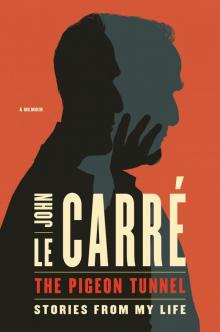 The Pigeon Tunnel: Stories From My Life
The Pigeon Tunnel: Stories From My Life Single & Single
Single & Single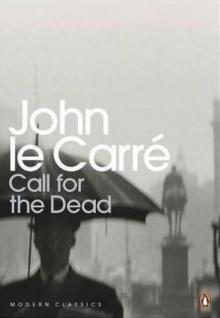 The Spy Who Came in From the Cold
The Spy Who Came in From the Cold The Looking Glass War
The Looking Glass War The Night Manager
The Night Manager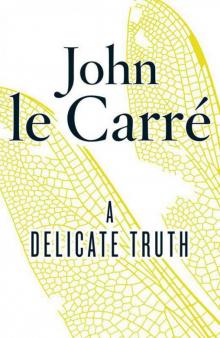 A Delicate Truth
A Delicate Truth A Perfect Spy
A Perfect Spy The Little Drummer Girl
The Little Drummer Girl Absolute Friends
Absolute Friends A Murder of Quality AND Call for the Dead
A Murder of Quality AND Call for the Dead The Russia House
The Russia House The Tailor of Panama
The Tailor of Panama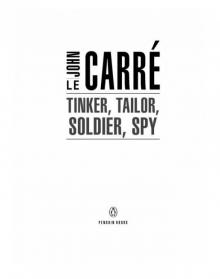 Tinker, Tailor, Soldier, Spy
Tinker, Tailor, Soldier, Spy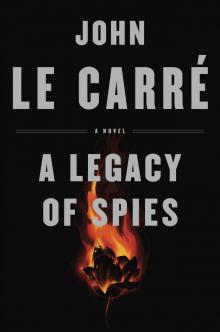 A Legacy of Spies
A Legacy of Spies The Mission Song
The Mission Song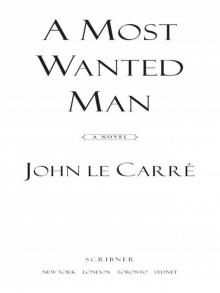 A Most Wanted Man
A Most Wanted Man John Le Carré: Three Complete Novels
John Le Carré: Three Complete Novels The Secret Pilgrim
The Secret Pilgrim A Small Town in Germany
A Small Town in Germany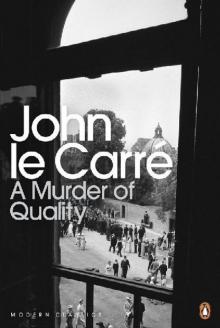 A Murder of Quality
A Murder of Quality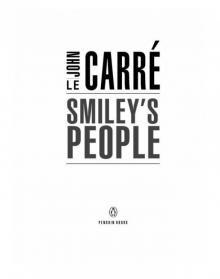 Smiley's People
Smiley's People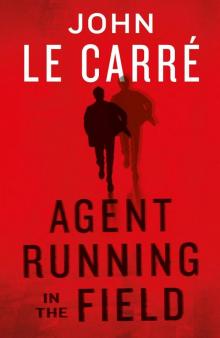 Agent Running in the Field
Agent Running in the Field The Spy Who Came in from the Cold s-3
The Spy Who Came in from the Cold s-3 The Pigeon Tunnel
The Pigeon Tunnel The Russia House - 13
The Russia House - 13 The Honourable Schoolboy
The Honourable Schoolboy Call For The Dead s-1
Call For The Dead s-1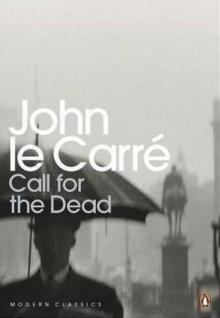 Call for the Dead
Call for the Dead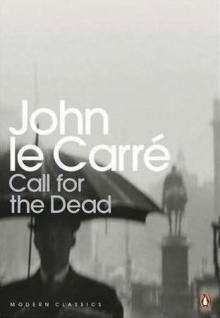 Call for the Dead - 1
Call for the Dead - 1